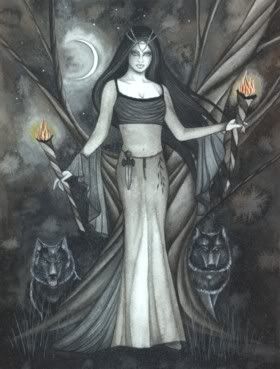
Hecate or Hekate is a Greco-Roman goddess associated with magic and crossroads.
Hecate, Greek goddess of the three paths, guardian of the household, protector of everything newly born, and the goddess of witchcraft. Once a widely revered and influential goddess, the reputation of Hecate has been tarnished over the centuries. In current times, she is usually depicted as a "hag" or old witch stirring the cauldron.
But nothing could be further from the image of Hecate's original glory.
A beautiful and powerful goddess in her own right, the Greek goddess Hecate was the only one of the ancient Titans who Zeus allowed to retain their authority once the Olympians seized control. Zeus shared with Hecate, and only her, the awesome power of giving humanity anything she wished (or withholding it if she pleased).
Usually classified as a "moon goddess", her kingdoms were actually three-fold . . . the earth, sea, and sky. Having the power to create or withhold storms undoubtedly played a role in making her the goddess who was the protector of shepherds and sailors.
A lover of solitude, the Greek goddess Hecate was, like her cousin Artemis, a "virgin" goddess, unwilling to sacrifice her independent nature for the sake of marriage. Walking the roads at night or visiting cemeteries during the dark phase of the moon, the goddess Hecate was described as shining or luminous.

In other legends she is invisible, perhaps only glimpsed as a light, a "will-o-the-wisp". Perhaps it was this luminous quality that marked Hecate as a "moon goddess", for she seemed quite at home on the earth.
Hecate came to be associated with ghosts, infernal spirits, the dead and sorcery. One interesting passage exists suggesting that the word "jinx" might have originated in a cult object associated with Hecate. "The Byzantine polymath Michael Psellus speaks of a bullroarer, consisting of a golden sphere, decorated throughout with symbols and whirled on an oxhide thong. He adds that such an instrument is called a iunx (hence "jinx"), but as for the significance says only that it is ineffable and that the ritual is sacred to Hecate.
The goddess Hecate was often accompanied on her travels by an owl, a symbol of wisdom. Not really known as a goddess of wisdom, per se, Hecate is nevertheless recognized for a special type of knowledge and is considered to be the goddess of trivia.
Hecate's farsightedness and attention to detail, combined with her extraordinary interest in that which most of us discount as irrelevant or arcane, gave her tremendous powers.
She knew what the rest of us did not.
No hay comentarios:
Publicar un comentario